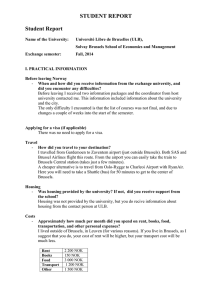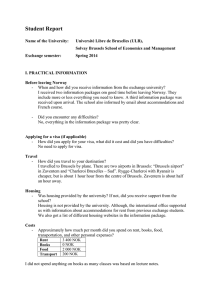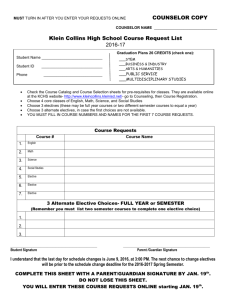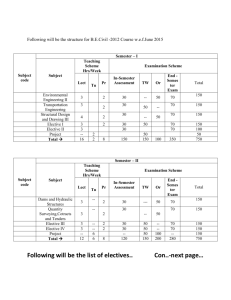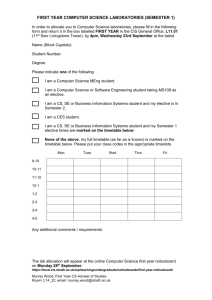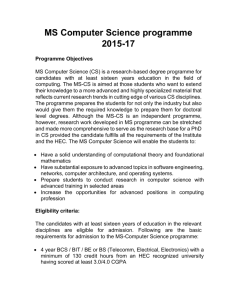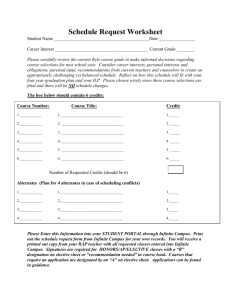Solvay - Fall 2012 - BI Norwegian Business School
advertisement
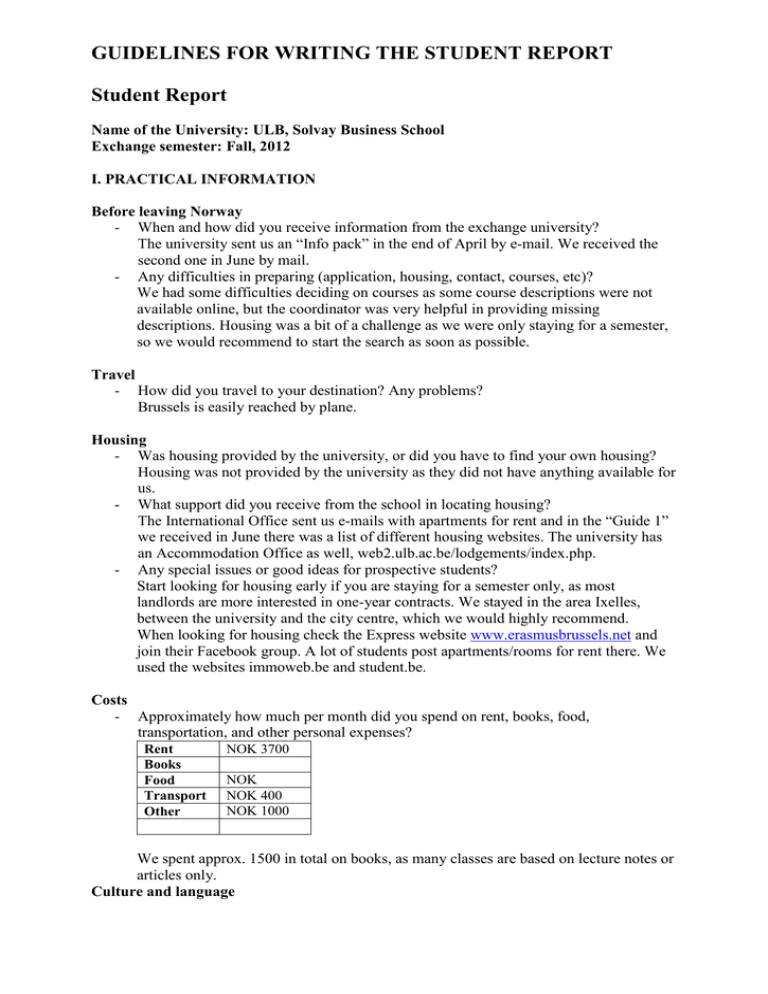
GUIDELINES FOR WRITING THE STUDENT REPORT Student Report Name of the University: ULB, Solvay Business School Exchange semester: Fall, 2012 I. PRACTICAL INFORMATION Before leaving Norway - When and how did you receive information from the exchange university? The university sent us an “Info pack” in the end of April by e-mail. We received the second one in June by mail. - Any difficulties in preparing (application, housing, contact, courses, etc)? We had some difficulties deciding on courses as some course descriptions were not available online, but the coordinator was very helpful in providing missing descriptions. Housing was a bit of a challenge as we were only staying for a semester, so we would recommend to start the search as soon as possible. Travel - How did you travel to your destination? Any problems? Brussels is easily reached by plane. Housing - Was housing provided by the university, or did you have to find your own housing? Housing was not provided by the university as they did not have anything available for us. - What support did you receive from the school in locating housing? The International Office sent us e-mails with apartments for rent and in the “Guide 1” we received in June there was a list of different housing websites. The university has an Accommodation Office as well, web2.ulb.ac.be/lodgements/index.php. - Any special issues or good ideas for prospective students? Start looking for housing early if you are staying for a semester only, as most landlords are more interested in one-year contracts. We stayed in the area Ixelles, between the university and the city centre, which we would highly recommend. When looking for housing check the Express website www.erasmusbrussels.net and join their Facebook group. A lot of students post apartments/rooms for rent there. We used the websites immoweb.be and student.be. Costs - Approximately how much per month did you spend on rent, books, food, transportation, and other personal expenses? Rent Books Food Transport Other NOK 3700 NOK NOK 400 NOK 1000 We spent approx. 1500 in total on books, as many classes are based on lecture notes or articles only. Culture and language GUIDELINES FOR WRITING THE STUDENT REPORT - Did you have any language problems with the faculty or other students? How were the possibilities to experience the country and the culture? Belgium is a small country and you can easily travel by train or bus. We made some daytrips to different areas of the country. In Brussels most people speak or have a little understanding of English. At the university all the teachers and administration has good English skills although with an accent. There is a different level of English on the different students on campus. In our experience the bachelor students are not as good as the master students but we only had contact with students in the English taught classes. ULB is a big campus and with a lot of different faculties, and every one has there own student union. All of these have a lot of different events that promote the school and the culture like dinners, student gatherings, and trips to different places around the country. The student organization express that takes care of the exchange students also has a lot of different events that give an impression and understanding of the culture and student life at ULB Cultural and social effects from the exchange experience - How do you think the exchange experience will affect you from a cultural and social point of view? - How do you think the exchange experience influences your future career possibilities? Being on exchange has given us the insight in the different cultures of the different nationalities of the people that are on exchange. Knowing what the different does and don’t will be a useful tool when it comes to international jobs aspects like relationship building and potential employment in other countries. Being on exchange gave us an international network. As mentioned the opportunity for getting jobs in foreign country will be potentially much easier when you have met people in that country. An international carrier is something that we both are interested in and that was the main reason for applying for exchange. II. ABOUT THE SCHOOL Please describe: - The school and its surroundings (give a short summary) Solvay Brussels school of economics and management is located at the Solboch campus of the ULB university, 20 minutes by bus from the city centre. The school building is new and very nice, but we did have classes in other old buildings on campus as well. - Current faculty divisions and special areas Solvay is well known in Belgium, and the fields of study are economics, business studies and management science. - Approx. number of students (graduate and undergraduate) and number of exchange students ULB has over 24 000 students, 30% of them coming from abroad. Solvay has 2700 students and about 180 exchange students. - Study structure Course registration - Were you able to register for courses before arrival? GUIDELINES FOR WRITING THE STUDENT REPORT - - - We could not register for courses before arrival. If not, when did you register? Any difficulties? The deadline for course registration was October 5., so we could attend the different classes before finally deciding on what courses to choose. If the school has a lottery or bidding system, describe this system and your experience in detail. Some courses only accept a limited number of exchange students. In some we had to sign up in the first lecture, in others places were given on a first come, first served basis. If you are interested in a class you should attend the first lecture. When and how long was the period for adding/dropping courses? October 5. is the final deadline for choosing courses. After that no changes can be made. Academic calendar Arrival date: First day of the semester: Last day of classes: Examination period: Any special events/holidays: September 6. September 10. December 24. (our classes finished on the 13th, but the semester ends the 24th January 7. – 26. September 27., November 1.-2., November 11. Other: Arrival - Was the administration and faculty well-prepared for your arrival? Yes, they held an information meeting for us, and were ready to answer any question we had. - Did the school’s students participate in the reception of the exchange students? Yes, both Express (the student association for exchange students) and the student union at Solvay arranged get-togethers and parties for exchange students. - Describe the introduction week? The introduction week was to a large extent arranged by Express with different events every day so we easily got to know other exchange students. The school hosted a welcome-drink for all the exchange students pub-crawls, tours of the city and game around the city, and the Solvay student union invited us to parties etc. The International Office - Is there an international office? Yes, there is an International Office run by the international coordinator. As an exchange student, did you receive sufficient and relevant information? In English? All information provided was in English. Promoting BI and Norway - What kind of activities were you involved in to promote exchange to Norway at your exchange university? There where not many opportunities to promote BI the one time we had an opportunity was an international day that was more about the countries than the school. On that GUIDELINES FOR WRITING THE STUDENT REPORT particular day the we both had a late class so we where not able to participate on that event. Social activities - How was the relationship among the exchange students? The relationship with other exchange students was very good. - Is there a student organization, and if so, are the exchange students a part of it? There is an organization for exchange students called Express. This group arranges different get-togethers and parties for the exchange students. - Are there any special activities and gatherings for exchange students? Yes, the Express team arranges trips, parties and gatherings throughout the semester. III. ACADEMICS In the classroom - Describe the teaching style. The teaching style is very much the same as at BI. Some have studies and interactive cases in class but that depends on what kind of classes you take - Language of instruction? Any problems? The language of instruction is either French or English. We only had courses in English. - How would you evaluate the level of study in relationship to the level at BI? The level is kind of the same as BI. Maybe a little lower but that is not very noticeable. - Is the teaching primarily practical or theoretical? Again it depends on the courses you take. The highly economical classes are more theoretical than management classes - Did professors use cases, group work or lectures (or a combination)? Most professors have cases and group-work in some form or another, either as examples and in classes or as hand-ins. - How is the workload compared to that at BI? It’s the same as it was on the bachelors. - Describe the relationship between professors and students. Same as BI there is no extraordinary relationship there. - Describe the relationship between the students in the classroom. Since most of the classes consist of people from Belgium or countries close, the most of the students are native French speaking people and not so vary good at speaking English so it’s not that easy to get to know the regular student in the different classes. Course materials - Describe the course materials used (books/literature, online articles, Powerpoint, etc). In most of the classes the literature is articles and lecture notes, some has books but they are not mandatory to read more for looking up the different subjects. - In which language were the course materials? English - How do you estimate the level of the course materials in comparison to BI? The same - Were materials used for detailed knowledge or a broad overview of a subject? GUIDELINES FOR WRITING THE STUDENT REPORT Depending on the classes you take most give you a broad look at the area of study, but the classes marked advanced looks more detailed about the area of study. Exams - Was the exam based on the course materials or on the lectures? - How was the course evaluated (include all that apply)? o Final exam (include form: written, oral, home assignment, presentation, etc.) o Mid-term exam o In-class quizzes throughout semester o Small assignments and/or papers o Presentations o Group work o Class attendance o Class participation/debates o Activities outside of the classroom o Other – if other, describe. Library and technology - Do students have easy access to the library and its resources? Yes, there are several libraries on campus. - Were computers provided around campus/in the library? We never used computers other than our laptops, but there are computer rooms on campus. - How is technology used in teaching or to distribute information? This is really up to the professor. Most professors put their slides, reading lists etc. online, either on their own sites, or on the school site Université Virtuelle. Description of courses Please list below all the courses you took while on exchange, including as many details as possible. Your comments are extremely useful for BI and for future exchange students, include information on the level of difficulty, relevance to your studies, if the course was practical/theoretical, any enrolment issues, etc. Most courses we had are at the same level of difficulty as master courses at BI (for bachelor students be aware that most classes in English are at master level). Not that many courses in English to choose from. The exams are generally held in January for the fall semester. At the time of writing this we have not had our exams. Course code & name GEST-S-487 GEST-S-428 Master/ Bachelor Experienc es in Managem ent Exam form Corporate 1-hour written 2-hours written exam or write report of one lecture and lead q&a with the guest lecturer Prerequ isites None Approved as Elective None Elective Comments Course consists of different topics from business presented by guest lecturers. Hard course to get a good grade in if you take the exam, but interesting. Curriculum based on lectures. Very good GUIDELINES FOR WRITING THE STUDENT REPORT Governan ce exam GEST-S-504 Corporate Restructur ing 1-hour written exam None Elective GEST-S-448 Organizati onal Behaviour and Leadershi p 1-hour written exam (you get the exam questions beforehand) None Elective GEST-S-467 Internatio nal Corporate Strategy 2 group works (reports of 3500 words and presentations of reports) Basic strategy course Elective The professor is good, but the group works are a lot of work compared to the learning outcome. ECON-0-403 European public Finance 3hour exam with two parts multiple choice and essay None Elective Highly theoretical classes with low participation incentive. GEST-S-519 European regulation and business environme nt Operation s and supply chain manageme nt Advanced accountin g Case and class participation 50% 2 hour exam 50% None Elective Theoretical course with high class participation incentive Two exams, one in each of the main subjects None Elective All the curriculum is on the slides they present in class Class tests10% Exam 90% Case study 10% extra Knowlag Elective e of financial accoutin g Big course with a lot of lectures theory and case/assignments these are not mandatory but you will loose 10% of the grade GEST-S- 482 GEST-S-409 professor. Curriculum based on lectures and articles. Same professor as corporate governance. Curriculum based on lectures and articles. Very interesting course with both theoretical and practical classes. This was written before the exam, but according to previous students the exam is relatively easy. Curriculum based on lectures and book. GUIDELINES FOR WRITING THE STUDENT REPORT Any other experiences/comments about your exchange experience?: Only thing is that the infrastructure is a little different than BI there is a lot more you have to do yourself. And instead of having @bi they have ten different websites that give all the info and you have to do all the work yourself unlike BI.
